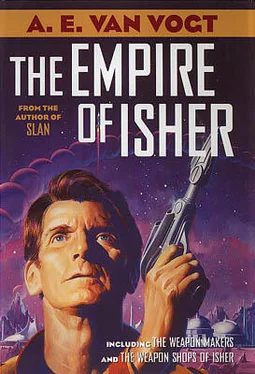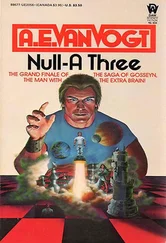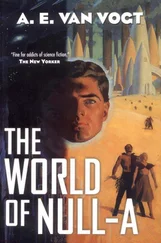There was no doubt that old Dr. Snow had told her the exact situation; and Innelda hadn’t liked it. And there was also no doubt, Hedrock realized as he listened to Dr. Telinger, that the new doctor had never been granted the privilege of a too thorough examination. She had picked well. He looked the kind of man who would be too awed to override the resistance of his Imperial patient.
“I’ve just discovered the truth,” he almost babbled at Hedrock. “She’s under antipain, but I’ve left a communication gap. Prince Hedrock, you must persuade her. It’s the baby or she, and her conviction that she will live is utterly unfounded. She has threatened me,” he finished whitely, “with death if the baby does not survive.”
Hedrock said, “Let me talk to her.”
She lay in the bed, calm and still. There was no color in her cheeks, and the rise and fall of her chest was so infinitesimal that she seemed already dead. Hedrock was conscious of relief when the doctor placed the communicator mask gently over that quiet yet intense face. Poor tyrant, he thought, poor, wretched, unhappy tyrant, caught up by inner forces too great for her to command or think through.
He picked up his end of the communicator. “Innelda,” he said tenderly.
“It’s—you—Robert.” The answer was slow in coming and yet fierce. “I told—them—not— to—let—you—come.”
“Your friends love you. They want to keep you.”
“They—hate—me. They think—I’m—a fool. But I shall show them. I will myself to live, but the child must live.”
“Prince del Curtin has married a lovely and wonderful woman. They will have beautiful children, worthy of the succession.”
“No child but mine—and yours—will rule in Isher’s name. Don’t you see, it is the direct line that matters. There has never been a break. There will not be now. Don’t you see?”
Hedrock stood sad. He saw even more clearly than she did. In the old days when, under various aliases, he had persuaded Isher emperors to marry women to whom family was vitally important, it had not seemed possible that the trait could ever become too strong. Here was proof that it could be tragic. And what this unhappy woman did not realize was that the reference to her “line” was only a rationalization. She wanted a child of her own. That was the simple reality.
“Robert—will you stay—and hold my hand?”
He stayed, and watched the life force ebb away. Waited till death lay heavily on the chilling body, and the baby was a thing whose raucous yowling made him angry.
Half a light year distant, a hundred-mile-long ship got under way. Inside it, thoughts vibrated from mind to mind:
“… The second general examination is almost as futile as the first in its basic results. We know some of the laws — but why did this ruler who possessed a world give her life for her child when in actuality she shrank from personal death? Her reasons that she personally must carry on her line are logically inadequate. It is only a matter of slight atomic rearrangement. Many men and women are alive who could carry forward her tribal progression.
“It remains but to bring her back to life, and make a record of the emotional reactions of those around her to her resuscitation.
“…X-x??—has investigated the appearance of our former prisoner Hedrock at the palace, and it appears that he nullified by an ingenious method the logic that required his destruction. Accordingly, we can leave the galaxy within one period.
“This much we have learned. Here is the race that shall rule the sevagram.”
The Weapon Shops of Isher (1951)
The Weapon Makers (1947)
Orb Books
An imprint of Tor Books
ISBN-10: 0-3128-7500-2











